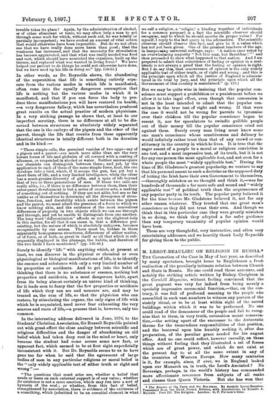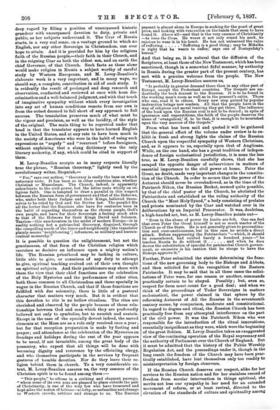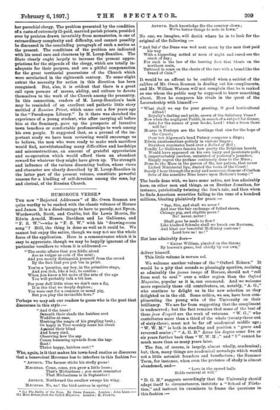M. LEROY-BEAULIEU ON RELIGION IN RUSSIA..* THE Coronation of the
Csar in May of last year, as described by many spectators, brought home to Englishmen a fresh realisation of the peculiarly intimate relation between Church and State in Russia. No one could read those accounts, and notably the striking article written by Bishop Creighton in the Cornhill Magazine, without feeling convinced that the great pageant was very far indeed from being merely a specially impressive ceremonial function,—that, on the con- trary, it was full of profound meaning to the people who assembled in such vast numbers to witness any portion of the stately ritual, or to be at least within sight of the sacred buildings within which it was to be performed. No one could read of the demeanour of the people and fail to recog- nise that to them, in very truth, coronation meant consecra- tion,—the setting apart of the successor to the Autocratic throne for the tremendous responsibilities of that position, and the bestowal upon him humbly seeking it, after due preparation, of the peculiar grace needed for his august office. And no one could reflect, however casually, on these things without feeling that they illustrated a set of forces which are of great power, and which do not exist at the present day to at all the same extent in any of the countries of Western Europe. How many centuries is it, for example, since, if ever, we in England looked upon our Monarch as, in truth, the Lord's Anointed ? No Sovereign, perhaps, in the world's history has commanded more affectionate reverence from subjects of all ranks and classes than Queen Victoria. But she has won that • The Empire of the Tsars and the Rus sians. By Anatole Leroy-Beanlien. Translated from the Third French Edition, with Annotations, by Zinalde A. Itazosin. Part III. The Religion. London: G. P. Pat nam's Sons.
deep regard by filling a position of unsurpassed historic grandeur with unsurpassed devotion to duty, private and public, as her subjects understand it. The Czar of Russia starts, in a very real sense, on a vantage ground to which no English, nor any other Sovereign in Christendom, can ever hope to attain. And it is provided for him by the religious faith of the Russian people,—their faith in their Church, and in the reigning Czar as both the eldest son, and on earth the chief Governor, of that Church. Such facts as these alone would make religion in Russia a subject worthy of careful study by Western Europeans, and M. Leroy-Beaulieu's elaborate work is a very important, and in many ways, we should say, a complete, contribution in aid of such study. It is evidently the result of prolonged and deep research and observation, conducted and reviewed at once with keen dis- crimination and a well-balanced judgment, and with that touch of imaginative sympathy without which every investigation into any set of human conditions remote from our own is from the outset doomed to fall short of any approach to full success. The translation preserves much of what must be the vigour and precision, as well as the lucidity, of the style of the original. The main thing to be regretted under that head is that the translator appears to have learned English in the United States, and at any rate to have been much in the society of Americans who were in the habit of using such expressions as " argufy " and " resurrect " before foreigners, without explaining that a slang dictionary was the only literary authority, if any, which could be cited in support of them.
M. Leroy-Beaulieu accepts as in many respects literally true the phrase, "Russian theocracy," lightly used by the revolutionary writer, Stepniak,—
" For," says our author, " theocracy is really the base on which autocracy rests. It has been so in other countries also, whether Christian or Mussulman. The Church, indeed, is apparently subordinate to the civil power, but the latter rests wholly on re- ligious faith. One is tempted to draw a parallel in this respect between the Russian form of government and that of the Hebrews, who, under both their Judges and their Kings, believed them- selves to be ruled by God and the Divine law. The parallel fits all the batter that the Russians also have for centuries been in the habit of regarding themselves as the chosen people, God's own people, and have for their Sovereign a feeling much akin to that of the Hebrews for their Kings David and Solomon. Taarism—this anachronism in the midst of modern Europe—is in reality nothing but a patriarchal theocracy, disguised, through the compelling needs of the times and neighbourly [the translator plainly means ' neighbouring'] influences, as military and bureau- cratical monarchy."
It is possible to question the enlightenment, but not the genuineness, of that form of the Christian religion which exercises so decisive an influence upon a mighty nation's life. The Russian priesthood may be lacking in culture, little able to give, or conscious of any duty to attempt to give, spiritual teaching evolved out of their own thought on spiritual subjects. And their parishioners may share with them the view that their chief functions are the celebration of the Holy Mysteries and the performance of other rites, both those common to all Christendom and those specially in vogue in the Russian Church, and that if those functions are fulfilled with due solemnity, there is little of a pastoral character that matters very much. But it is evident that this devotion to rite is no hollow ritualism. The rites are cherished and observed by the people because of those rela- tionships between God and man which they are profoundly believed not only to symbolise, but to nourish and sustain. Except in the case of the specially devout indeed, the sacred elements at the Mass are as a rule only received once a year ; bat for that reception preparation is made by fasting and prayer; and attendance at the celebration of the Mysteries on Sundays and holidays daring the rest of the year appears to be usual, if not invariable, among the great body of the peasantry, who expect that all things will be done with becoming dignity and reverence by the officiating clergy, and who themselves participate in the services by frequent gestures of humble devotion. Nor do they leave their re- ligion behind them in church. To a very considerable ex- tent, M. Leroy-Beaulieu assures us, the very essence of the Christian spirit is to be found among them :—
" This people," he affirms in a striking and eloquent passage, " whom some of its own sons are pleased to place outside the pale of Christianity, is one of the very few who have treasured and kept alive the notion of hoitners—so lofty, so unfamiliar and strange to Western crowds, sublime and strange to us. The Russian peasant is almost alone in Europe in seeking for the pearl of great price, and looking with veneration on the hands that seem to have found it. Above all—and that is the very essence of Christianity —he loves the Cross. He wears it not only round his neck, he rejoices to wear it in his heart. He has not unlearned the value of suffering Suffering is a good thing ; may be Mikalka is right that he wants to suffer,' says one of Dostoyefsky's heroes."
And that being so, it is natural that the diffusion of the Scriptures, at least those of the New Testament, which has been sanctioned, though in a somewhat fitful manner, by authority in Russia during the greater part of the present century, has met with a genuine welcome from the people. The New Testament, M. Leroy-Beaulieu assures us,
"Is probably in greater demand there than in any other part of Europe, except the Protestant countries. The Gospels are un- doubtedly the book dearest to the Russian. It is to be found in the working man's room as well as in the peasant's cabin. Those who can, read it to others. Every new step gained by popular instruction brings new readers. All that the people have in the way of religious and moral training they get there. The influence of the book upon the Russian soul is not to be denied ; in spite of ignorance and superstitions, the faith of the people deserves the name of ' evangelical,' if, to be that, it is enough to be nourished upon the very marrow of the Gospels."
From what has been said and quoted it will be gathered
that the general effect of the volume under review is to ex- hibit in fresh and strong lights the claims of the Russian Church upon the respectful sympathy of Western Christians, and, as it appears to us, especially upon that of Anglicans. While, on the one band, she has a great tradition of indepen- dence of foreign ecclesiastical jurisdiction, it is none the less true, as M. Leroy-Beaulieu carefully shows, that she has escaped the opposite danger of subservience in matters of essential importance to the civil power at home. Peter the Great, no doubt, made very important changes in the constitu- tion of the Church. In order to secure that the power of the Autocrat should never be overshadowed, as in the time of the Patriarch Nikon, the Russian Becket, seemed quite possible, by that of the chief pastor of the Church, he abolished the Patriarchate and established as the ruling authority of the Church the " Most Holy Synod," a body consisting of prelates
and priests nominated by the Czar and watched over in its deliberations by an Imperial Procurator. It was, doubtless, a high-handed act, but, as M. Leroy-Beaulieu points out— "Even in the abuse of power its limits are felt. One can feel that even Peter the Great himself is not so much master of the Church as of the State. He is not generally given to procrastina- tion and over-cautiousness, but in this case he avoids a direct attack. Before suppressing the Patriarchate "—which, it should be remembered, had existed barely a hundred years —" he
teaches Russia to do without it and when he does decree the substitution of synodal for patriarchal Church govern- ment, so excessive is his caution that he stoops to have the Bishops approve it."
Further, Peter submitted the statute determining the func- tions of the new governing body to the Bishops and Abbots,
and then solicited for it the recognition of the Eastern Patriarchs. It may be said that in all these cases the solici-
tations of Peter were, for one reason or another, commands practically certain to be obeyed. Possibly ; but, even so, respect for form must count for a good deal; and when we think of the proceedings of Tudor Sovereigns in matters ecclesiastical, the power claimed in that sphere by the reforming Autocrat of All the Russian in the seventeenth century seems, by comparison, moderate and constitutional. In regard to dogma and ritual, the Russian Church has been practically free from any attempted interference on the part of the civil power. It was the Patriarch Nikon who was
responsible for the introduction of the ritual innovations, essentially insignificant as they were, which were the beginning of the great Schism. M. Leroy-Beaulieu takes an exaggerated view of the continuing operation of the Royal supremacy and the authority of Parliament over the Church of England. But it must be admitted that the history of the Public Worship Regulation Act, and the proceedings under it, though in the long result the freedom of the Church may have been prac- tically established, have lent themselves only too readily to misinterpretation by foreign observers.
If the Russian Church deserves our respect, alike for her services to the Russian nation and for her stainless record of freedom from secular intervention in things spiritual, she merits not less our sympathy in her need for an extended movement of reform, or at least revival, directed to the elevation of the standards of culture and spirituality among
her parochial clergy. The problem presented by the condition of a caste of extremely ill-paid, married parish priests, presided over by prelates drawn invariably from monasteries, is one of extraordinary complexity and difficulty, and cannot possibly be discussed in the concluding paragraph of such a notice as the present. The conditions of the problem are indicated with his usual care and clearness by M. Leroy-Beaulieu. The State clearly ought largely to increase the present appro- priations for the stipends of the clergy, which are totally in- adequate for their purpose, and are a pitiful compensation for the great territorial possessions of the Church which were secularised in the eighteenth century. To some slight extent the necessity for action in this direction has been recognised. Bat, also, it is evident that there is a great call upon persons of means, ability, and culture to devote themselves to the work of the Church among the peasantry. In this connection, readers of M. Leroy-Beaulien's book may be reminded of an excellent and pathetic little story entitled A Russian Priest, which came out a few years ago in the "Pseudonym Library." In it there was sketched the experience of a young student, who after carrying all before him at the Seminary, gave up the prospects of lucrative town benefices or comfortable professorships to work among his own people. It suggested that, as a perusal of the im- portant study we have been reviewing would encourage us to believe, the men who were ready to make such sacrifices would find, notwithstanding many difficulties and hardships and misconstructions, an amount of grateful appreciation and co-operation which would afford them an abundant reward for whatever they might have given up. The strength and influence of the various dissenting bodies, whose views and character are clearly described by M. Leroy-Beaulieu in the latter part of the present volume, constitute powerful reasons for a kindling of self-devotion among the sons, lay and clerical, of the Russian Church.








































 Previous page
Previous page